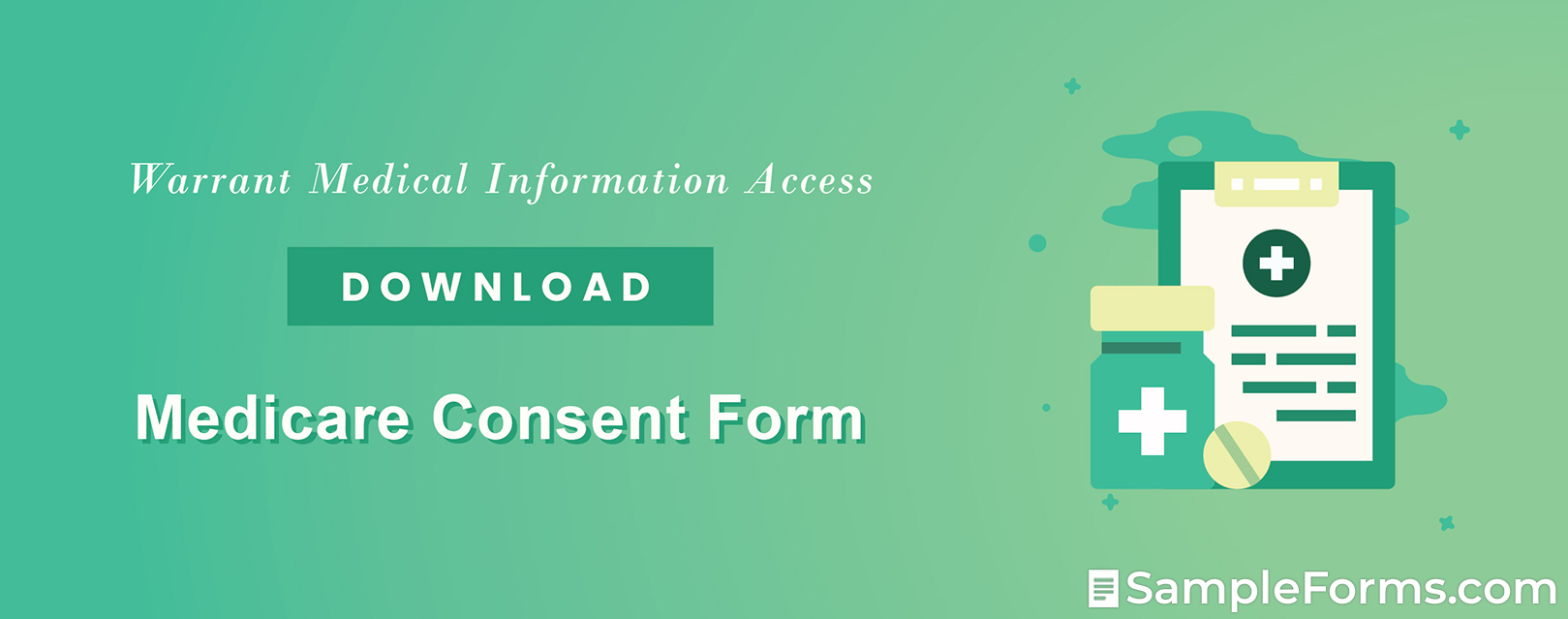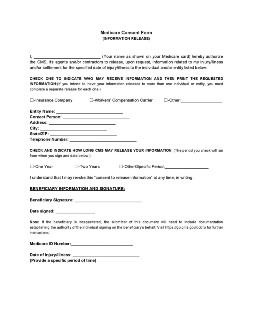- Eviction Notice Forms
- Power of Attorney Forms Forms
- Bill of Sale (Purchase Agreement) Forms
- Lease Agreement Forms
- Rental Application Forms
- Living Will Forms Forms
- Recommendation Letters Forms
- Resignation Letters Forms
- Release of Liability Agreement Forms
- Promissory Note Forms
- LLC Operating Agreement Forms
- Deed of Sale Forms
- Consent Form Forms
- Support Affidavit Forms
- Paternity Affidavit Forms
- Marital Affidavit Forms
- Financial Affidavit Forms
- Residential Affidavit Forms
- Affidavit of Identity Forms
- Affidavit of Title Forms
- Employment Affidavit Forms
- Affidavit of Loss Forms
- Gift Affidavit Forms
- Small Estate Affidavit Forms
- Service Affidavit Forms
- Heirship Affidavit Forms
- Survivorship Affidavit Forms
- Desistance Affidavit Forms
- Discrepancy Affidavit Forms
- Guardianship Affidavit Forms
- Undertaking Affidavit Forms
- General Affidavit Forms
- Affidavit of Death Forms
Medicare Consent Form
Although we prize the privacy of our medical information, sometimes it’s necessary to disclose them to have our out-of-pocket expenses reimbursed. And whether if it’s for our insurance carriers or our employers, signing a medicare consent form is one way of relieving ourselves from the burden of expensive medical treatment. Learn how by reading on further. Read More
What Is a Medicare Consent Form?
A medicare consent form authorizes the release of our medical information, including our medical condition and the settlement/payment associated with it. This consent form allows the CMS to release our medical information to our benefactors—our insurance and worker’s compensation carriers, employers, and attorney—to secure the reimbursement of our medical expenses.
Since Medicare can’t divulge any information without the beneficiary’s consent, a representative must present a documentary proof certifying that they’re authorized to sign the form on our behalf. Furthermore, we must also include our medicare ID number and date of when we were treated to validate the request of releasing our medical information to our benefactors.
How To Complete a Medicare Consent Form
Treatment for injuries and other ailments are very expensive and way beyond affordability. That’s why many of us turn to medicare, and other medical insurance carriers, to make medical treatment well within our reach. But before that happens, they must have access to your medical information first before they’ll reimburse you. Now listed below are tips on how to complete a medicare consent form and recover your expenses.
1. Start by Naming the Beneficiary
First off, filling out a medicare consent form starts by naming the beneficiary or the patient who received the medical treatment. And for us to do this, we must see to it that we put the exact name found in our medicare IDs on the first statement of the form. Doing so helps in pulling our medical information out from their files.
2. Indicate the Party Requesting for the Information
Next, after naming the beneficiary or patient on the medicare consent form, we must then indicate the party requesting the information. These parties often need our medical information so that we can recover the expenses we incurred during our treatment and medication. To do so, we must specify them along with their names, contact persons, addresses, and contact details regardless of whether they’re our insurance and worker’s compensation carriers, employers, or attorney.
3. Specify When the Information Shall be Released
Another thing we must do in completing this consent form is to set the date of releasing our medical information. Our benefactor, or the requesting party, may need this information on a specific date. We can either have our medical records released a year or two years from now or set an exact date of our choosing.
4. Sign the Consent and Release Form
After filling the medical consent form with all the necessary information, the next step to this whole process is to sign it. In doing this, don’t forget to include the date the form was signed along with our medicare ID numbers. Moreover, we must also indicate the date we received medical treatment as well. Doing this step correctly helps the CMS find and pull out our medical information as quickly as possible.
5. Attach a Copy of the POA if Signing for the Beneficiary
Now, there will be instances where the beneficiary is unable to sign the medical consent themselves. And in that case, we may find ourselves authorizing the release of their medical records. For us to do this without any hitches, we must see to it that a copy of a medical POA is attached to the consent form itself. Doing this prevents us from wasting every effort that we put in helping the beneficiary recover the expenses for medical treatment.
Frequently Asked Questions
What are medicare consent forms for?
Medicare consent forms are used to authorize the release of a beneficiary’s medical information to their benefactors—insurance and worker’s compensation carriers, employers, and attorney. These benefactors need a beneficiary’s information to determine the extent of their medical expenses and to have them covered or reimbursed.
Who can sign a medicare consent form?
Medicare consent forms are documents that carry a beneficiary’s authorization to release their medical records to their benefactors. So that means only a beneficiary can sign a medicare consent form. However, a beneficiary can appoint a representative to sign a medicare consent form, on their behalf, if ever they are unable to do so. All they need to do is to present a copy of the power of attorney from the beneficiary.
Where do we submit medicare consent forms after signing them?
Medicare consent forms are usually submitted to the CMS or The Centers for Medicare & Medicaid Services. It is a federal agency that administers the Medicare program, including the release of its members’ or beneficiaries’ medical records. You can submit a medicare consent form to this address: NGHPPO Box 138832 Oklahoma City, OK 73113 Fax: (405) 869-3309.
Can anyone request for my medical information without consent?
No. Medicare or the CMS will not release any medical information about their members or beneficiaries without prior consent. This is to protect and maintain the confidentiality of the beneficiaries’ medical information. If a party needs to get hold of a beneficiary’s medical information, they must first obtain written authorization from the beneficiary.
Why do benefactors need our medical information before reimbursement?
Benefactors such as our insurance and compensation carriers need our medical information to determine the extent of our medical expenses that needs reimbursement. Sometimes, our benefactors would also use such information to cover for our medical treatment as well. But, other benefactors such as our attorneys need such information to file for medical claims for injuries caused by accidents and the like.
Medical treatment is always expensive, and socialized medical insurance programs such as medicare allowed us to access to affordable medical care. However, such programs have their limits. But by signing a medicare consent form, we can ease-up our burdens and worry about nothing more but our speedy recovery.

